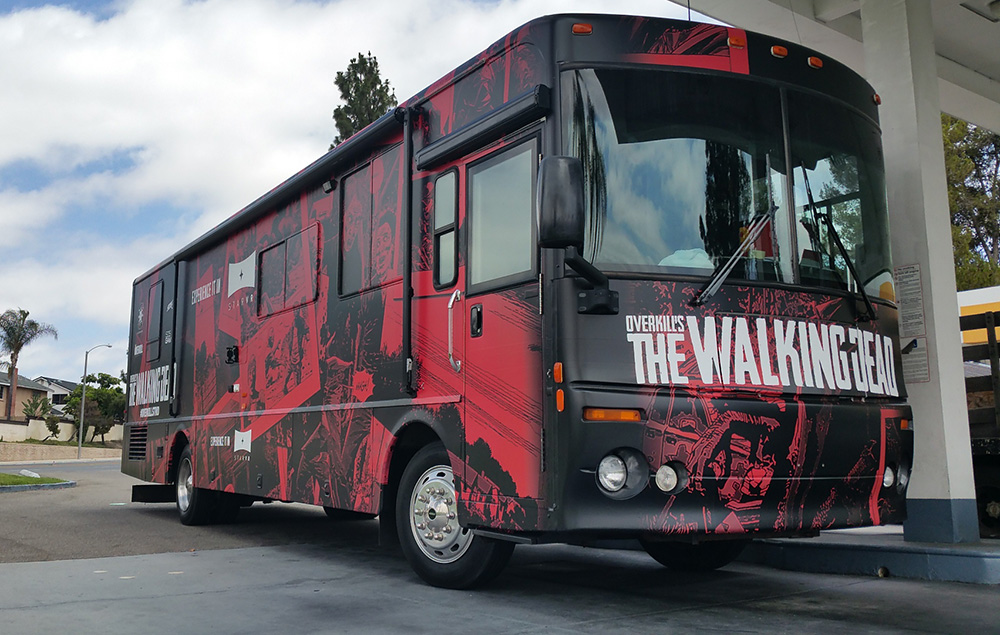Skybound Interactive is taking a patient approach when it comes to virtual reality gaming. The interactive division of Skybound Entertainment, which is best known for The Walking Dead, has released its first original VR game, Giant Cop.
Dan Murray, president of Skybound Interactive, discovered the indie game from Other Ocean Interactive on a trip to the Philippines, where he was visiting an art team that works on multiple games. The actual Oculus Touch game was developed in Newfoundland, Canada.
“I was struck by how fun it was, and it had a strong narrative component to it and a unique voice, which I thought would be exciting for Skybound fans,” Murray told AListDaily.
Now that the game has shipped for Oculus Rift with Touch support as a timed exclusive, Murray said versions will be released in the future for HTC Vive and PlayStation VR. There are also bigger plans for the IP outside of gaming.
“It starts as a game first and then the conversation is organic as we bring the idea to the rest of the company across all of the different departments so they can see the potential behind the IP and see how we can partner up and add value,” Murray said.
Skybound is using its network of 1.7 million Skybound Insiders to market the $24.95 game, which received a marketing push at EGX Rezzed through Influencers and press. Also, Facebook-owned Oculus, which helped defray some of the development costs in exchange for a timed exclusive window, is also cross-promoting the title.
“This is more of a long-term play,” Murray said. “We’re not a marketing agency or a traditional publisher, we’re a partner on content. We have a lot of plans to support and share this game with all of our fans. We do a lot of internal communication with our fan base.”
Skybound Interactive is also working with Starbreeze and Overkill on The Walking Dead shooter for PC and consoles, as well as The Walking Dead VR game demo, which has made the rounds of trade shows and public conventions over the past few years.
“It was an extension to the PC and console first-person shooter and the VR component was something they wanted to pursue as a test case for some of their ambitions,” Murray explained. “We were cool with that, but we also wanted to bring it to fans so we made an Overkill’s The Walking Dead bus and drove it around to our Walker Stalker conventions.”
Murray said that first step into VR is now being polished for an IMAX version, but the team is also working on the next iteration of The Walking Dead VR experience as well.
“We have a lot of different ideas, and we want to do something really big with Starbreeze, but the focus right now is on the PC and console game,” Murray said. “We have some other game ideas for The Walking Dead that are different as well, but that’s something to talk about soon.”
Murray sees room for both home-based and location-based VR games as the company explores virtual reality.
“It makes perfect sense to deliver something over-the-top and exciting to take advantage of the more powerful hardware for the premium experience inside of a location, which is not very different than what the movie theater experience is versus your 4K TV at home,” Murray said.
When it comes to VR gaming, Murray said the company is working on a bunch of unannounced projects, but the key is in looking at titles that will innovate and deliver something fresh and exciting.
“Our business model is to partner with creators around an IP,” Murray said. “Traditionally we did that with comic books and extended the universe outward. We did a SuperFight card game and YouTube series and a 505 video game and all kinds of other merchandise around it. That same philosophy is important for us to be thinking about licensing things like we did with The Walking Dead. We wanted to reach out to the indie gaming community and find developers that have strong IPs and things they want to develop.”
That holds true for all video game platforms, including virtual reality.
“There’s been so much activity around VR as a medium since Oculus entered the market, and it’s something that the gaming community has been familiar with for over a decade,” Murray said. “It’s still early days, especially in the home. We’ll continue to see the hardware get better and more affordable and more consumer-friendly. It’s going to take a while for the home environment to become the leading location for where people can experience VR. Location-based entertainment centers are very much a recreation of the arcades that I grew up with. They have the ability to introduce VR to more people, as well as bring people together socially.”

